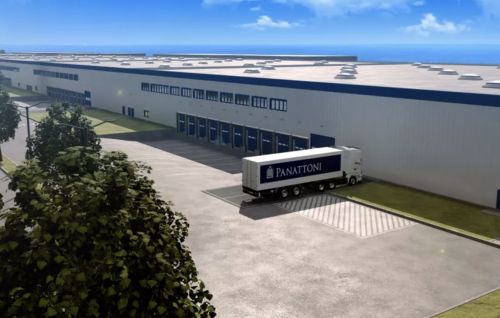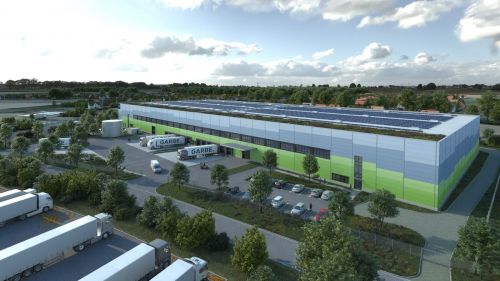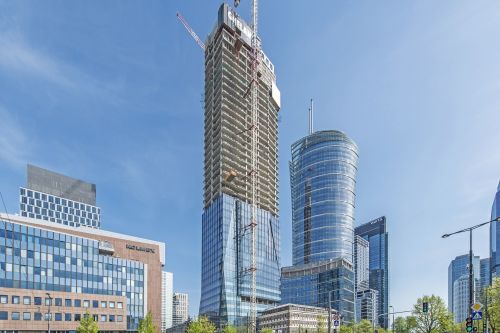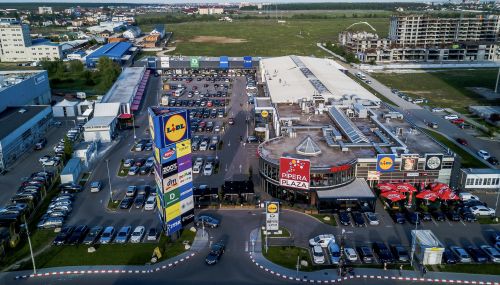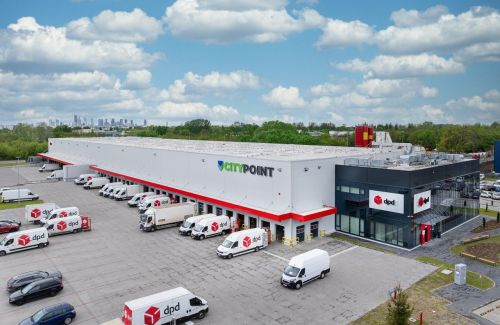Distinctive structures
Investment & Finance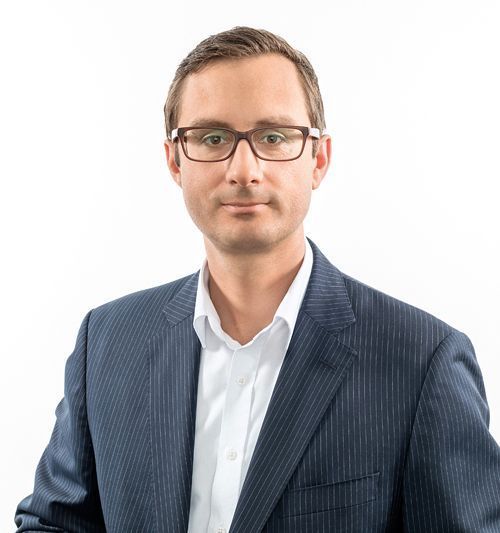
Rafał Ostrowski, ‘Eurobuild CEE’: The main project you are working on in Poland is J44 – also known as Widok Towers. It is located at Warsaw’s main intersection, on Al. Jerozolimskie and ul. Marszałkowska, on the site of the now demolished Universal building. Could you tell us more about this project?
Henning Koch, global head of transactions, Commerz Real: It’s going to be a 27-storey skyscraper with roughly 37,000 sqm of office space, so it will be a real landmark building on the best site in the city. We are currently in the process of obtaining the full building permit. This should happen this year, so we should be able to start the construction quickly. Our aim is to complete the project in 2020–2021. What we are currently doing is optimising the project for the long term. Usually developers just try to optimise a project in a way that allows them to quickly sell it off for the maximum profit – quite possibly to an investor who does not check the details or have a clear concept for the building. For us, however, it is important to create a building that can be successful in the long term – after all, our fund is already 46 years old. We want to create something special on this market.
Do you have your own special way of developing buildings?
I think every development and every market is different. You cannot just copy projects from other markets. But we have a very clear vision about the future tenant profile. You can see just how popular co-working is at the moment. We believe it is not always necessary to lease offices to co-working operators. Instead, you can give the premises a similar style, you can bring in many more amenities and services and make sure that the lease contracts are much more flexible. We want to have plenty of tenants to diversify the premises.
Shorter leases and plenty of investors – it sounds like a lot of work will be needed to manage such a building.
Absolutely, but this is our understanding of the job we have. We are an asset manager and want to make sure that our shareholders and our investors have stable and sustainable returns – and therefore we want to differentiate ourselves from the rest of the pack. It is very difficult in today’s world to be distinctive, but in this sector we have a completely different approach to many other investors.
If I understand you correctly, you’re saying that the likes of WeWork won’t be in Widok Towers?
While we cannot rule out a very attractive offer that might persuade us otherwise, we are currently not planning on housing coworking operators. We believe it isn’t necessary to have such intermediaries. They generally sublease the space with really high costs and rents to other tenants. I think we can offer very similar services – but with more attractive termds for the occupiers.
So what will be unique about this building?
It’s a bit too early to go into the details, because we are still in the phase of fine-tuning the design. But the most unique thing will be the flexible workspace. This, I think, will be the major differentiator.
After the sale of Pałac Jabłonowskich on ul. Senatorska in Warsaw city centre, you now have only two buildings in Poland, that is, the Harmony Office Centre and Tulipan House, both in Mokotów district. And you also have Widok Towers under construction. What are you planning in the future?
We are certainly going to expand on the Polish market. We strongly believe in this market in terms of its economy, its talented people and its young workforce. The fundamentals here are very good. The GDP growth, for instance, is one of the best in Europe. In comparison to other European countries it is a great success story. So we definitely want to expand and want to buy more. It could be through other developments using the normal forward-funding or forward-purchase structure, where we already have the project in place and just buy it as an end-investor. We might also do more like J44, where we buy the plot and look for a fee-developer, with whom we then create the project together. But obviously as an investor we need to generate cash-flow and distribute it to our shareholders, so we are also interested in already existing income producing buildings, which are stable, rented premises. We believe this is really a good moment to buy in Warsaw. You are able to buy prime buildings for EUR 4,000
–6,000 per sqm – and that is not something you can find in most of other major European cities.
Which real estate sectors will you be targeting in Poland?
I think we are pretty flexible in terms of sectors. Offices, retail, logistics, hotels... even residential would be fine – for example, student housing or micro-
apartments or in mixed-use projects. But, as I said, we have one criterion that we really just don’t want to compromise on: the location. This needs to be absolutely prime. It doesn’t have to be only in Warsaw. We are currently looking at other major cities as well, such as Poznań, Łódź, Gdańsk and Kraków. We are picking the best buildings and best locations in these markets. Of course, the cities need to have a critical size – if they’re too small, the market won’t be liquid enough. We will most likely want to exit the investment at some point, and therefore it’s important to know whether there’s an institutional market in these locations or not. But if you look at Kraków, for example, it has a lot of foreign investors who have committed to this market, Poznań as well. So, these are definitely places where I think you could make some very good deals.
How hard is it to find the kind of opportunities that you are looking for on the Polish market?
I think there are clearly plenty of opportunities around – and it’s not so difficult to identify the good ones. But obviously there is sometimes a gap between the expectations of buyers and sellers. We have been screening the market in the last five-to-six months quite intensively. We have secured exclusivity for two or three deals, meaning two for definite and another one hopefully soon. It’s really more about identifying the right opportunities so we can take advantage of them. But the reason why we’re taking a close look at the Polish market is that some investors were a little nervous last year, and maybe this year too, because of the political situation and the potential for some destabilisation. While we have also been looking at those issues as well, the market fundamentals are much more important for us.
Do you feel that your approach is different to some of your German rivals?
I think we are a little bit different to our major German competitors. Compared to them we are more prepared to take on greater risks. If you look at the J44 development, few of our competitors would be able to do the same. Generally, they all want to see significant pre-leases or just want to have a completed building. But we are ready to take on these risks to a certain extent, provided that the location is fine.
How much will you be investing?
Right now, we have roughly EUR 250 mln of assets under management, if you include the total construction costs for the J44 project. We could easily double that amount or even surpass it in the next twelve months. What I can say now, however, is that Poland is one of our major targets. We have a very keen interest in adding to our portfolio here. But in the end, this will be opportunity driven. We want to be flexible and – if we see three, four or five opportunities in Warsaw, Poland and other places – we are able to take them easily. And we would be in a position to launch them immediately, without waiting another 24 months, because the cash is available, the liquidity is available. But there is no pressure to do this now, if the right product isn’t available. We don’t want to compromise just to fulfil our investment targets.
Is EUR 250 mln all that you are planning to invest in Poland – or will there be more to come?
If you run a EUR 14 bln fund you clearly have the potential to grow further; but, of course, we will probably not be doing several developments in Warsaw at the same time. It’s important to be diversified. First, we want to complete the J44 project – and hopefully this will be a great success; and only then will we take on another project with a similar profile.
What about outside Poland, such as in other parts of the CEE region. What are your plans for these markets?
In terms of the CEE region, we are only focusing on Poland and the Czech Republic right now. We are a bit cautious when it comes to Romania, Bulgaria and the other markets.
Until recently, Commerz Real hasn’t really been buying centrally located properties in Poland.
We have a different approach now. The general conditions have changed, and not only for Poland, but for all countries. We are monitoring the market and recently made a bid for a very prominent Warsaw hotel, but there was another bidder who was prepared to go that extra mile with the price, and so we didn’t win it. But we are really very flexible across all the sectors.











































